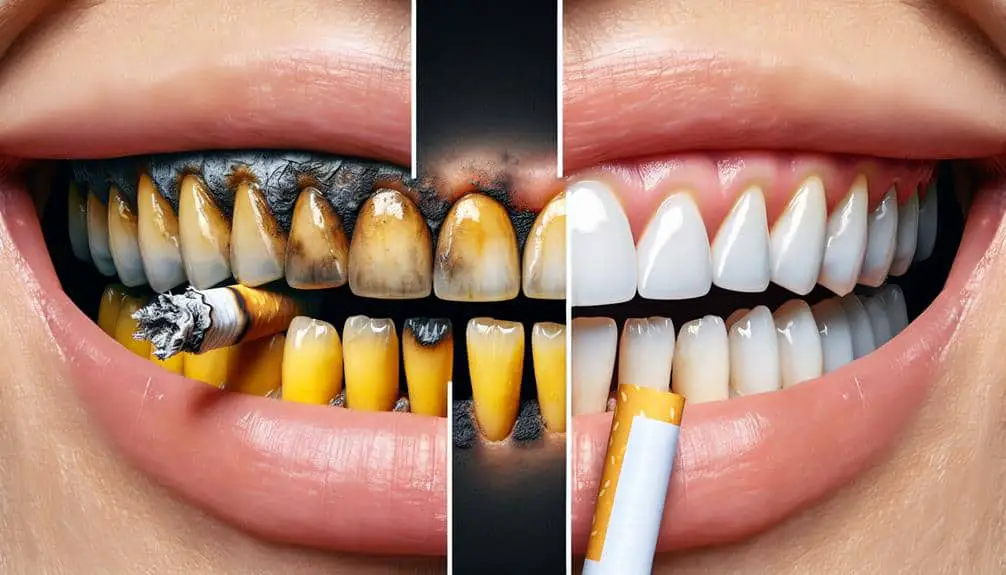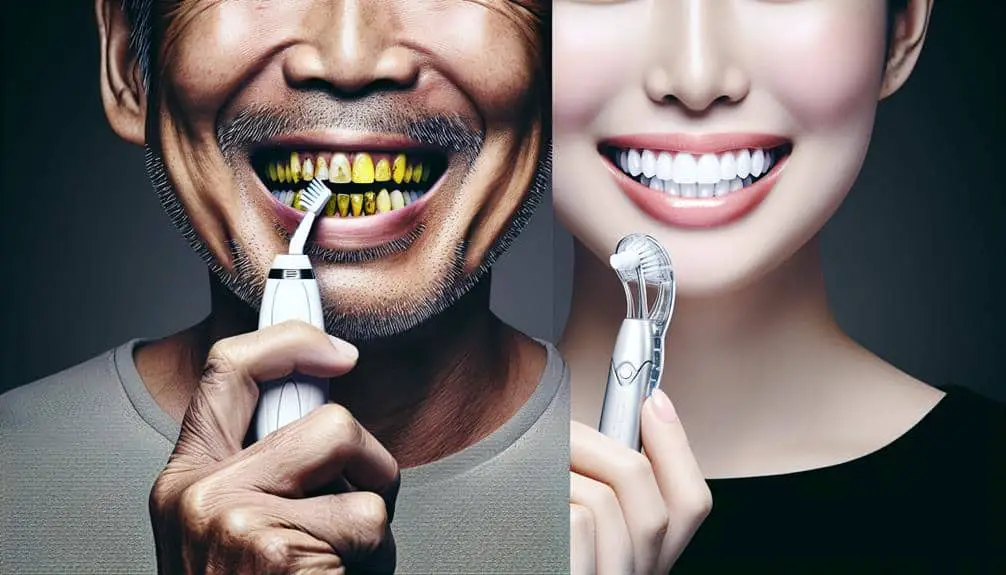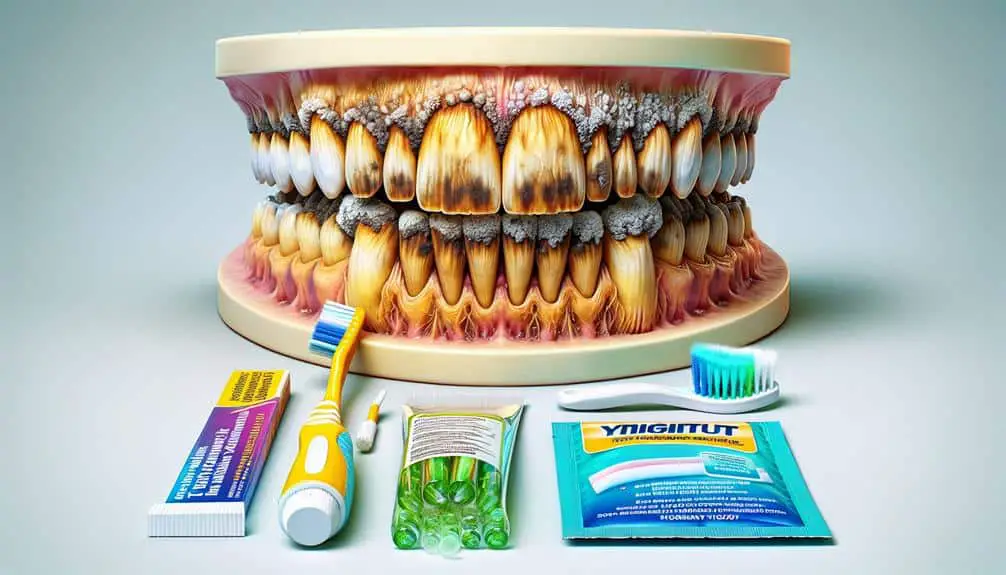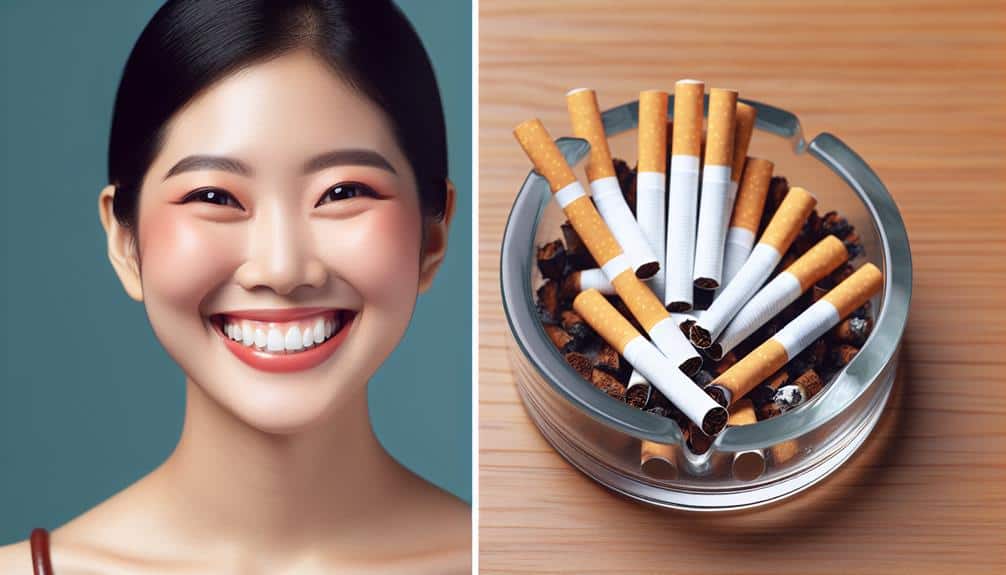Combat the yellow or brown stains from smoking with teeth whitening tailored for smokers. Professional treatments target tough nicotine discoloration effectively, ensuring noticeable results. Dental professionals can recommend personalized options like customized trays or in-office laser procedures for a whiter smile. Additionally, home remedies such as using baking soda or oil pulling with coconut oil offer cost-effective ways to maintain brighter teeth. Give your smile a new shine with these tips!
Key Points
- Professional whitening treatments are effective for combating smoking stains.
- Customized trays and bleaching agents target nicotine-induced yellowing.
- Consulting dental professionals ensures personalized whitening recommendations.
- In-office procedures like laser whitening deliver noticeable results.
- Over-the-counter products may not effectively remove tough tobacco stains.
Effects of Smoking on Teeth
Smoking stains and damages teeth, leading to discoloration and increased risk of oral health issues. Tobacco stains caused by smoking can penetrate the enamel of your teeth, resulting in unsightly yellow or brown discoloration that regular brushing may not fully remove. This discoloration not only affects the appearance of your teeth but also indicates the importance for more severe dental problems. Maintaining good dental hygiene is vital in combating the effects of smoking on your teeth. Brushing twice a day, flossing regularly, and scheduling routine dental check-ups can help prevent further staining and deterioration of your teeth.
In addition to the visible effects of tobacco stains, smoking can also contribute to gum disease, tooth decay, and bad breath. The chemicals in tobacco products can irritate the gums, leading to inflammation and potential infection. This, combined with poor dental hygiene practices, creates an environment conducive to oral health issues. Protecting your teeth and gums from the harmful effects of smoking requires diligence in both oral care and cessation of smoking habits.
Common Teeth Discoloration Causes
Teeth discoloration can result from various common causes besides smoking, such as certain foods, beverages, and poor oral hygiene habits. While smoking is a significant contributor to teeth staining, other factors can also play a role in the discoloration of your teeth. Here are some common causes:
- Coffee Stains: Coffee is a popular morning beverage for many, but its dark pigments can lead to yellowing and staining of teeth over time.
- Aging Effects: As we age, the enamel on our teeth naturally wears down, revealing the yellowish dentin underneath, which can cause teeth to appear discolored.
- Poor Oral Hygiene: Inadequate brushing and flossing can allow plaque and tartar to build up on teeth, leading to discoloration and potentially more severe oral health issues.
Understanding these common causes of teeth discoloration can help you make informed choices to prevent and address this issue for a brighter, whiter smile.
Whitening Options for Smokers
Consider exploring professional teeth whitening treatments to effectively combat the discoloration caused by smoking and other factors. Tobacco stains and nicotine yellowing are common issues that smokers face when trying to whiten their teeth. Over-the-counter whitening products may not be potent enough to tackle these stubborn stains effectively. Professional whitening options offer stronger solutions that can penetrate deep into the enamel, providing more noticeable results.
Professional teeth whitening treatments performed by dentists often involve customized trays and bleaching agents that are specifically designed to target tough stains like those caused by smoking. These treatments can help break down the nicotine yellowing and tobacco stains, revealing a brighter and whiter smile.
In-office procedures such as laser whitening or professional-grade bleaching treatments can be tailored to address the specific needs of smokers, ensuring a more thorough removal of stains. Dentists have access to stronger whitening agents that can deliver significant improvements in a shorter amount of time compared to over-the-counter products. When considering teeth whitening as a smoker, consulting with a dental professional for personalized recommendations is essential in achieving a brighter, smoke-free smile.
Professional Whitening Procedures
For individuals seeking effective solutions to combat stubborn stains caused by smoking, exploring professional whitening procedures tailored to address tobacco discoloration can offer significant improvements in achieving a brighter smile. When it comes to in-office treatments for smoker's teeth whitening, dental bleaching stands out as a popular and effective option. Here are some key points to ponder:
- Customized Treatment Plans: Dentists can develop personalized treatment plans based on the severity of discoloration, ensuring targeted and efficient whitening results.
- Professional Supervision: Undergoing dental bleaching in a professional setting guarantees that the procedure is monitored by trained professionals, minimizing risks and maximizing outcomes.
- Quick and Long-lasting Results: In-office treatments often deliver faster and more noticeable results compared to at-home remedies, providing a significant improvement in the brightness of your smile that lasts longer.
Home Remedies for Brighter Teeth
To enhance your at-home oral care routine and further brighten your smile, exploring natural remedies and DIY techniques can be a cost-effective and convenient option. When looking for natural solutions to whiten your teeth, consider incorporating baking soda into your dental hygiene regimen. Baking soda has mild abrasive properties that can help remove surface stains on teeth. You can create a paste by mixing a small amount of baking soda with water and brushing your teeth gently with it a few times a week.
Another DIY treatment to try is oil pulling with coconut oil. This ancient practice involves swishing a tablespoon of coconut oil in your mouth for about 15-20 minutes to help remove plaque and bacteria that cause discoloration. Remember to spit out the oil after swishing and rinse your mouth with water.
Additionally, incorporating crunchy fruits and vegetables like apples, carrots, and celery into your diet can help naturally clean your teeth and maintain their brightness. These foods can act as natural teeth cleaners by stimulating saliva production and scrubbing away surface stains.
Frequently Asked Questions
Can Smoking Cessation Reverse the Discoloration Caused by Years of Smoking?
Quitting smoking is the key to reversing discoloration caused by years of smoking. Smoking cessation improves oral health and, coupled with proper dental care, can help restore the natural whiteness of your teeth over time.
Are There Any Long-Term Effects of Smoking on Oral Health Even After Teeth Whitening?
Smoking cessation greatly benefits oral health by reducing risks of gum disease, tooth loss, and oral cancers. However, even after teeth whitening, long-term effects of smoking like increased plaque buildup and decreased gum health may persist.
How Often Should Smokers Undergo Teeth Whitening Treatments to Maintain a Brighter Smile?
To maintain a brighter smile, smokers should consider professional teeth whitening treatments every 6-12 months for best results. At-home whitening can be used in between visits for maintenance, but professional treatments yield more effective and longer-lasting outcomes.
Are There Any Specific Toothpaste or Mouthwash Products Recommended for Smokers to Prevent Further Discoloration?
To keep your smile bright, choose whitening toothpaste and mouthwash formulated for smokers. These products can help prevent further discoloration. Remember, regular dental check-ups and procedures like veneers can also enhance your smile's radiance.
Are There Any Dietary or Lifestyle Changes That Can Help Smokers Maintain a Brighter Smile After Whitening Treatments?
To maintain a brighter smile after whitening treatments, consider dietary changes like reducing sugary and acidic foods. Lifestyle adjustments such as quitting smoking can also help. Natural remedies like oil pulling or baking soda can supplement your oral care routine.
Conclusion
To sum up, achieving a brighter smile as a smoker is possible with the right whitening options. Despite the discoloration caused by smoking, professional whitening procedures and home remedies can help restore the natural whiteness of your teeth.
Just like a painter adding the final strokes to a masterpiece, you can enhance your smile and confidence with these effective techniques.
Don't let smoking stains dull your smile any longer – take action today for a brighter, healthier smile.



